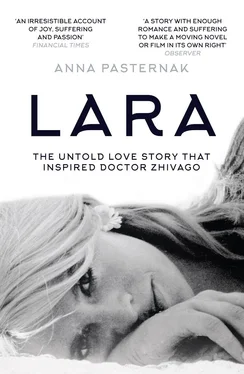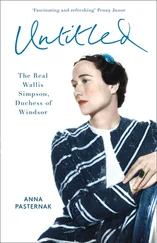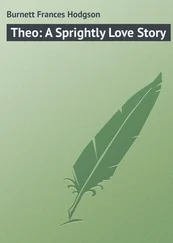I leaned back in Boris’s chair in his study and considered how often he must have turned back from the undulating view to his page (he wrote in longhand), inspired, to create scenes of longing between Yury and Lara. When I was there the snow was gently falling outside, enhancing the stillness. The room is almost painful in its plainness. In one corner stands a small wrought-iron bed with a sketch of Tolstoy hanging above it and family drawings by Boris’s father, Leonid, to each side. With its drab grey patterned cover and the reddish brown cut-out square of carpet close by, the bed would not have been out of place in a monastic cell. Opposite, a bookcase: the Russian Bible, works by Einstein, the collected poems of W. H. Auden, T. S. Eliot, Dylan Thomas, Emily Dickinson, novels by Henry James, the autobiography of Yeats and the complete works of Virginia Woolf (Josephine Pasternak’s favourite author), along with Shakespeare and the teachings of Jawaharlal Nehru. Facing the desk, on an artist’s easel, a large black and white photograph of Boris himself. Wearing a black suit, white shirt and dark tie, I considered that he looked about my age, mid-forties. Pain, passion, determination, resignation, fear and fury emanate from his eyes. His lips are almost pursed, set with conviction. There was nothing soft or yielding about his sanctuary; he saved his sensuousness for his prose.
I thought about Boris’s courage, a courage that meant he could sit there and write his truth about Russia. How he defiantly stared the Soviet authorities in the face, and how persecution and the threat of death eventually took its toll. How, despite outliving Stalin, in spite of his colossal literary achievements, he lived his last years here in imposed isolation, the Soviet authorities watching and monitoring his every move. His study became his personal quarantine: writing upstairs; his wife Zinaida downstairs, chain-smoking as she played cards or watched the clunky antique Soviet television, one of the first ever made.
And I imagined his lover Olga Ivinskaya, in the last years of Boris’s life, anxiously waiting for him every afternoon to join her in the ‘Little House’ across the lake at Izmalkovo, a kilometre away. Here she would soothe and support, encourage and type up his manuscripts. Not visible in his home by way of cherished photograph or painting, her absence is jarring. For what is the love story in Doctor Zhivago if it is not his passionate cri de coeur to Olga? I thought of her endlessly reassuring him of his talent when the authorities taunted that he had none; how she brought fun and tenderness into his life when everything else was so strategic, harsh, political and fraught. How she loved him but, just as crucially, how she understood him. Many artists are selfish and self-indulgent, as he was. It would be easy to conclude that Boris used Olga. It is my intention to show that, rather, his great omission was that he did not match her cast-iron loyalty and moral fortitude. He did not do the one thing in his power to do: he did not save her.
Looking around his study for the last time, I knew that I wanted to write a book which would try to explain why he performed this uncharacteristic act of moral cowardice, putting his ambition before his heart. If I could understand why he behaved as he did and appreciate the extent of his suffering and self-attack, could I forgive him for letting himself and his true love down? For not publicly claiming or honouring Olga – for not marrying her – when she was to risk her life loving him? As he writes in Doctor Zhivago : ‘How well he loved her, and how loveable she was in exactly the way he had always thought and dreamed and needed … She was lovely by virtue of the matchlessly simple and swift line which the Creator at a single stroke had drawn round her, and in this divine outline she had been handed over, like a child tightly wound up in a sheet after its bath, into the keeping of his soul.’
*Josephine married her cousin, Frederick Pasternak, hence the continuation of the surname.
†Every Russian has three names. A first name, a patronymic and a surname. The patronymic name is derived from the father’s first name. The usual form of address among adults is the first name and the patronymic.
1
A Girl from a Different World

Novy Mir , meaning ‘New World’, the leading Soviet literary monthly where Olga Ivinskaya worked, was set up in 1925. Literary journals such as Novy Mir , the official organ of the Writers’ Union of the USSR, enjoyed huge influence in the Stalinist period and had a readership of tens of millions. They were vehicles for political ideas in a country where debate was harshly censored, and the contributors held enormous sway in Russian society. The offices in Pushkin Square were situated in a grand former ballroom, painted a rich dark red with gilded cornices, where Pushkin once danced. The magazine’s editor, the poet and author Konstantin Simonov, a flamboyant figure with a silvery mane of hair who sported chunky signet rings and the latest style of American loose-fitting suits, was keen to attract ‘living classics’ to the journal, and counted Pavel Antokolsky, Nicolai Chukovski and Boris Pasternak among its contributors. Olga was in charge of the section for new authors.
On an icy October day in 1946, just as a fine snow was beginning to swirl outside the windows, Olga was about to go for lunch with her friend Natasha Bianchi, the magazine’s production manager. As she pulled on her squirrel fur coat, her colleague Zinaida Piddubnaya interrupted: ‘Boris Leonidovich, let me introduce one of your most ardent admirers,’ gesturing to Olga.
Olga was stunned when ‘this God’ appeared before her and ‘stood there on the carpet and smiled at me’. Boldly, she held out her hand for him to kiss. Boris bent over her hand and asked what books of his she had. Astounded and ecstatic to be face-to-face with her idol, Olga replied that she only had one. He looked surprised. ‘Oh, I’ll get you some others,’ he said, ‘though I’ve given almost all my copies away …’ Boris explained that he was mainly doing translation work and hardly writing any poems at all due to the repressive strictures of the day. He told her that he was still translating Shakespeare plays.
Throughout his writing career, Pasternak earned the bulk of his income through commissioned translation work. Proficient in several languages, including French, German and English, he was deeply interested in the intricacies and dilemmas of translating. Gifted in interpreting, and conveying a colloquial essence, he was to become Russia’s premiere translator of Shakespeare, and would be nominated for the Nobel Prize six times for his accomplishments in this area. In 1943 the British embassy had written to him with compliments and gratitude for his efforts translating the Bard. The work provided several years of steady income. He told a friend in 1945: ‘Shakespeare, the old man of Chistopol, is feeding me as before.’
‘I’ve started on a novel,’ he told Olga at Novy Mir , ‘though I’m not yet sure what kind of thing it will turn out to be. I want to go back to the old Moscow – which you don’t remember – and talk about art, and put down some thoughts.’ At this stage, the novel’s draft title was ‘Boys and Girls’. He paused, before adding a little awkwardly: ‘how interesting that I still have admirers …’. Even at the age of fifty-six, more than twenty years Olga’s senior, Pasternak was considered handsome in a strong, striking way, despite the fact that his elongated face was often likened to an Arab horse’s – hardly flattering – partly because he had long yellowish teeth. It seems slightly disingenuous that Boris should have questioned that he had admirers – a faux modesty – when he knew perfectly well that he had a hypnotic effect on people, and that men and women everywhere were in awe of him. The Russian poet Andrei Voznesensky, to whom Pasternak would become a mentor figure, was captivated by the poet’s dazzling presence the first time he met him, that same year, 1946:
Читать дальше













